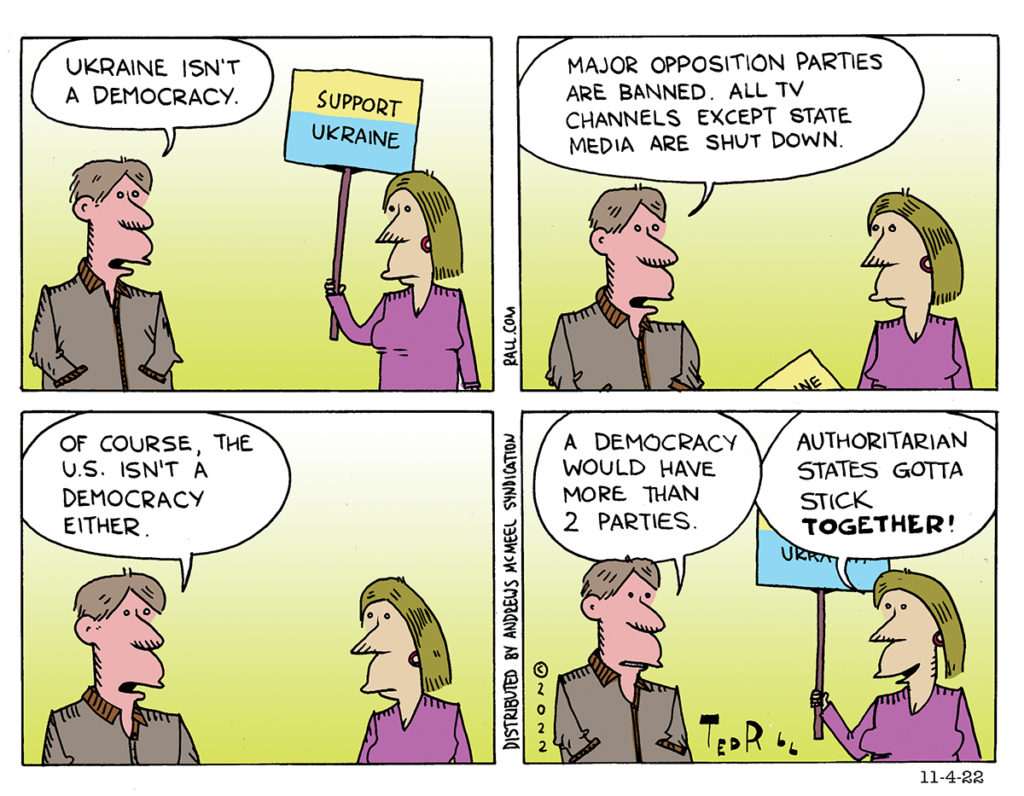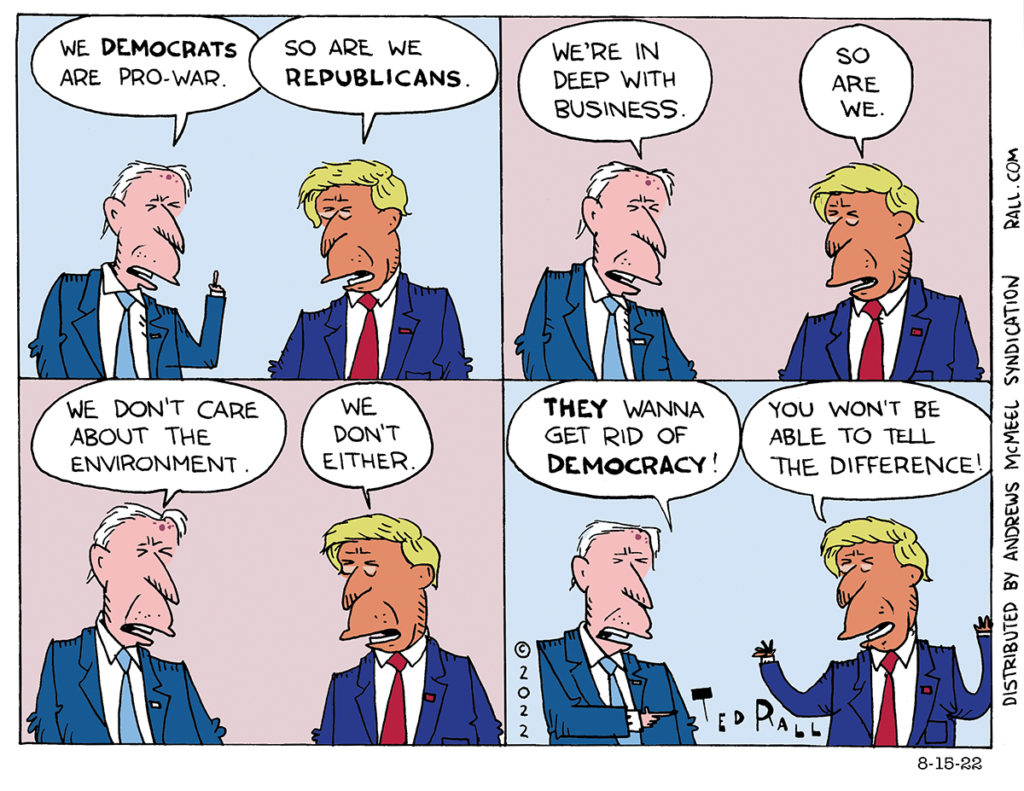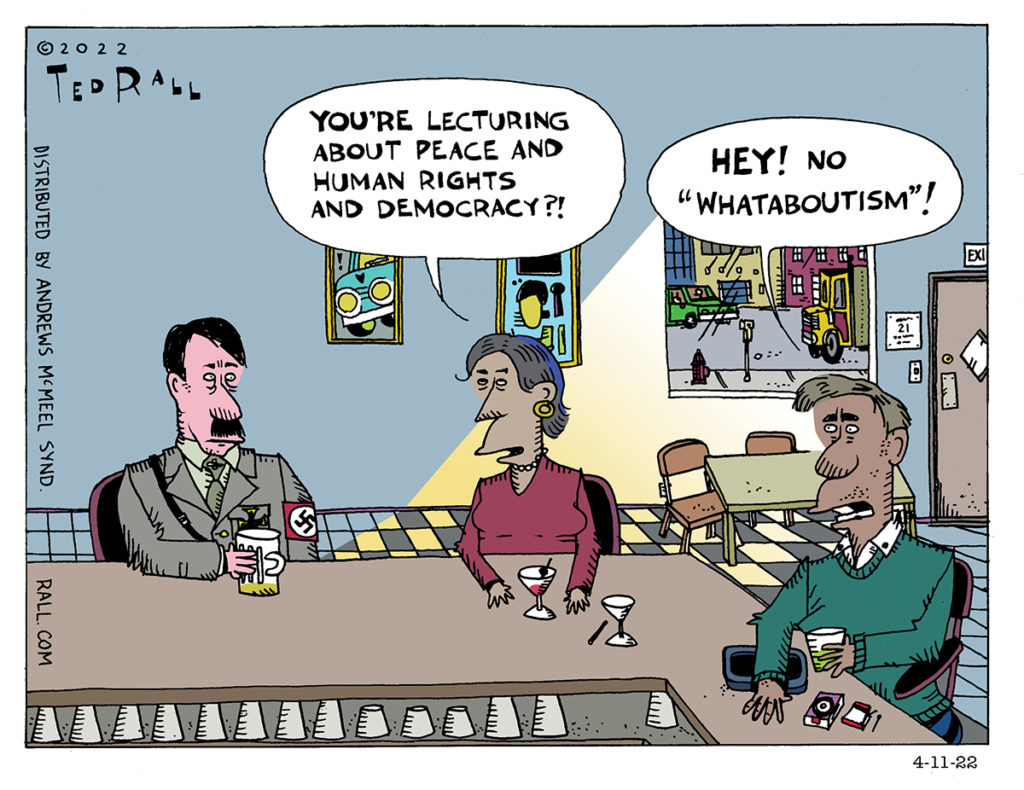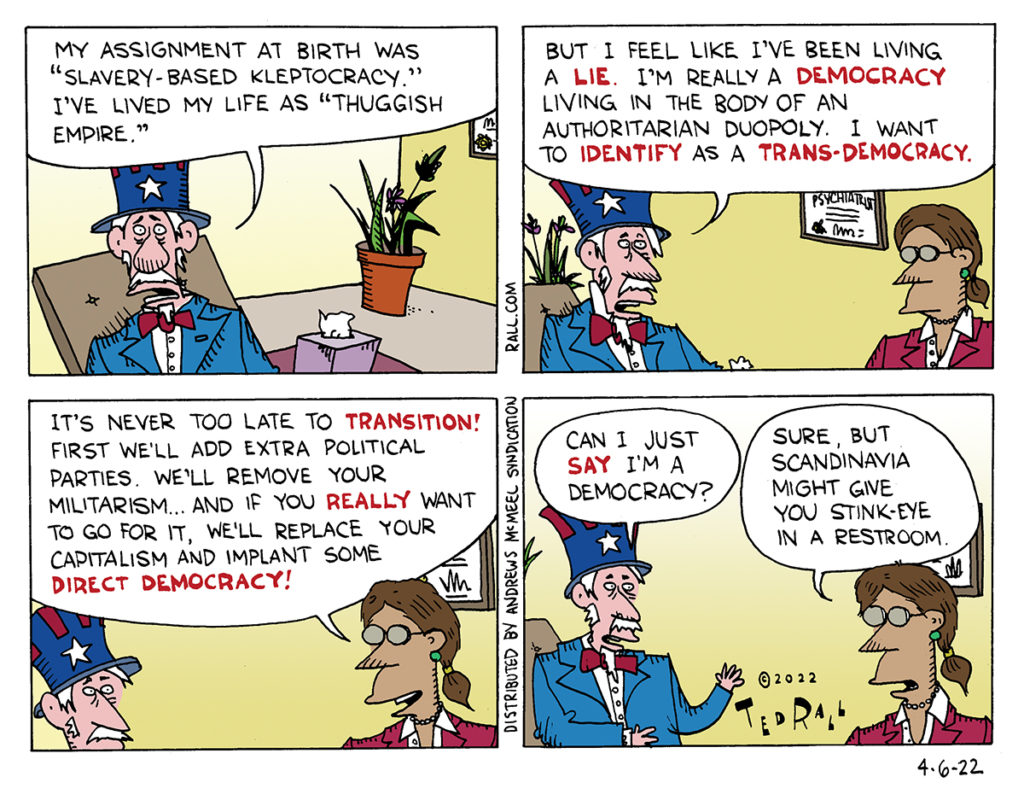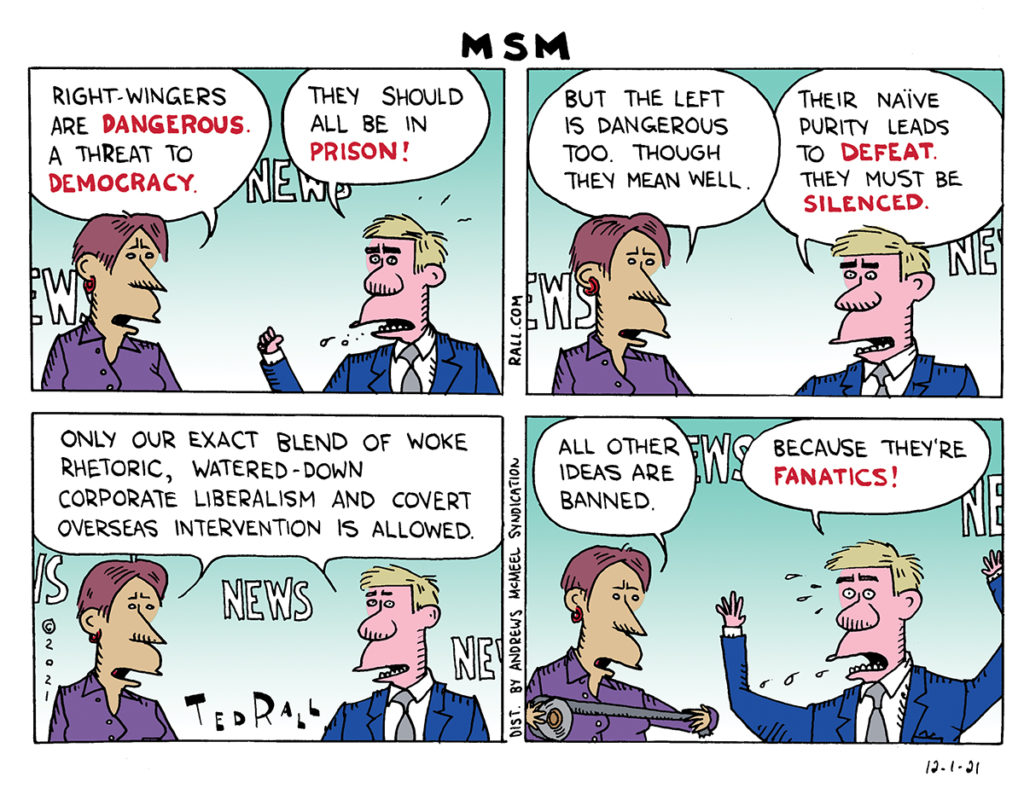Supporters of Ukraine keep saying that it’s a democracy. But it’s not. President Zelensky has banned rival political parties and shut down all media outlets except for official state media that supports him. On the other hand, the United States doesn’t really have much democracy to brag about either.
The Two-Party System is Under Attack, Stupidly
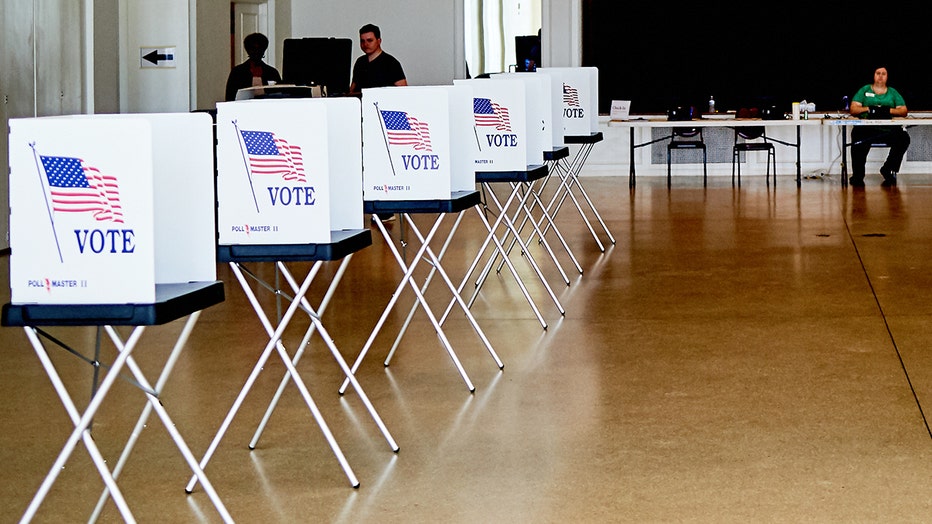
At least at first, America’s founders famously disliked political parties, and so failed to provide for them in the Constitution. Like them or not, however, the two-party system has prevailed for 95% of our history. Given that third parties face high barriers to obtain ballot access, are shut out of televised debates and routinely denied media exposure, the duopoly is likely to be with us for the foreseeable future.
A corollary to Toqueville’s observation that a well-informed electorate is essential to democracy is that fuzziness and confusion at the ballot box means that voters cannot make an informed decision, will feel cheated and fooled, and will eventually lose faith in electoral politics altogether.
Alas, our two-party system is being corrupted by forces and reforms that trick and manipulate voters.
I’m not talking merely about the longstanding phenomenon of the conservative DINO Democrat or the liberal RINO Republican, though gray-zone wishy-washies do muddy the waters. What used to be a relatively simple choice between the party of liberalism and the common man versus the party of tradition and business is under heavy fire.
This year, for example, Democrats spent $53 million on ads across nine states on “six gubernatorial races, two Senate contests, and five House campaigns,” according to The Washington Post, in order to help far-right MAGA candidates and smear their moderate Republican opponents in GOP primaries—in the words of The New York Post editorial board, “putting their money where Donald Trump’s mouth is” on a bet that Trump-aligned Republicans will be easier to beat this November. Democratic interference worked in four of those.
Both parties have done this sort of thing before, but on nothing close to this scale.
Setting aside the hypocrisy of Democrats characterizing extremist Republicans as an existential threat to democracy and financing those nutty right-wingers so they advance closer to elected office, funneling funds across party lines is a fraud against voters of both parties. Democratic donors don’t send checks to the Democratic Party in order to support the Republican Party. If Dems asked their supporters for permission to divert their donations to their supposed political enemies, that would be something else—but there’s no evidence of that.
At the same time, the money sidelined for this mother of all Democratic dirty tricks covert operation might otherwise have been directed to cash-poor Democratic candidates who could have used it to prevail in the general election. The whole party is thus arguably a fraud.
If Republican primaries aren’t a forum for debate and discussion between and for Republicans only, what’s the meaning of a Republican nominee? Perhaps in an open- primary state they should be listed on general-election ballots as “Mostly Republican” or “Somewhat Republican,” since it’s theoretically possible for more than half the voters in a primary race to be Democrats.
More fundamentally to democracy, people who vote in these races are unaware of some major facts. If Democratic voters knew that their own party helped the “extreme right” Republican nominee, they might withhold their vote from both candidates in order to protest this practice. On the other hand, Republican voters might not reflexively support “their” party’s nominee if they thought they were being duped. Or they might be more likely to do so in order to teach Democrats a lesson. D vs. R isn’t the same as D vs. R*, though they’re labeled the same.
Federal campaign finance laws ought to be clarified in order to prohibit the redirection of monies raised to support the candidates of one party to those of another party.
Washington, California, Nebraska and Alaska have abolished party primaries in favor of blended primaries in which the top-two vote-getters compete in the general election. The law of unintended consequences is epitomized by this misbegotten attempt to reduce polarized outcomes, which has not worked. California’s top-two system was supposed to increase voter participation; instead Republican voters often stay home in the many districts where the general election is a face-off between a progressive Democrat and a moderate Democrat. Democrats often recruit insincere Republicans to dilute the Republican field enough to push their name into the top two. “Now you have someone in every little f—ing Assembly race trying to prop up the Republican,” Paul Mitchell with Political Data Inc. told CalMatters. “It’s become a part of the process as much as lawn signs. It’s part of the California campaign war chest.”
In the recent Alaska contest for Congress lost by former governor Sarah Palin, 60% of voters wanted a Republican. Yet a Democrat won.
Blended primaries have disenfranchised California Republicans and made it impossible for the average voter to understand who is paying for whom and why. Furtive motivations behind candidacies are anathema to a vibrant democracy that are supposed to be battles of ideas.
Whatever their flaws, political parties provide concise branding for voters who prefer to spend their time doing something other than studying the 50-page ranked-voting guide sent to New York City voters in the last mayoral race. As a political cartoonist and writer, I am as well informed as any citizen can reasonably be expected to be, yet it isn’t realistic to expect me or anyone else to know about the personal and political history of every minor candidate. Like many voters, I’ve never heard of most of the hopefuls for city council or judges so I vote straight party line on the (hopefully not too incorrect) assumption that party affiliation relates to ideological bent. Nonpartisan primary systems require an excessive level of engagement and should be abolished.
Similarly, open primaries in which people registered to one party may vote in the rival party’s primaries undermine the most appealing aspect of a two-party system, the ability of liberals to choose a liberal standardbearer without conservative influence and vice versa. Half the states have full, or partial open presidential primaries in which independent nonaffiliated voters may participate in a partisan primary.
Especially in races where one party’s nominee runs unopposed, as did Barack Obama for the Democratic nomination in 2012, it is tempting for that party’s partisans to vote in the rival party’s open primaries for the express purpose of causing mischief. 7% of votes cast in Georgia’s recent “Republican” primaries were Democrats. Brian Kemp trounced David Perdue, the weaker candidate for whom the crossover Democrats most likely voted. But it isn’t hard to find other examples where 7% would change the outcome.
I would have found it fun and hilarious, if I lived in Georgia, to vote in the Republican primary to mess with the results. As a leftist who believes systems ought to work fairly and intelligently, my right to a good time shouldn’t trump democracy.
I would prefer a parliamentary system. Nations with set or de facto two-party systems like the United States (56% in 2016), the United Kingdom (62%), Canada (62%) and Japan (53%) have significantly lower voter participation rates than those with multi-party democracies like Turkey (89%), Sweden (82%) and Israel (78%). The cause is self-evident. Voters are more motivated to turn up at the polls when their preferred party might win a seat at the table; a minor party may join a coalition government under a parliamentary system.
But let’s stick to reality. Until we free ourselves of the Democratic-Republican stranglehold, we’re stuck with the two-party system. And that system ought to be as easy to navigate as a supermarket shelf. Whether it’s a can of food or a political candidate, what is on the label of a product ought to be contained inside.
(Ted Rall (Twitter: @tedrall), the political cartoonist, columnist and graphic novelist, co-hosts the left-vs-right DMZ America podcast with fellow cartoonist Scott Stantis. You can support Ted’s hard-hitting political cartoons and columns and see his work first by sponsoring his work on Patreon.)
Now Those Guys Are Really Scary.
President Biden delivered a primetime speech that was marketed as an appeal to protect American democracy but directly targeted President Trump and his Republican supporters as the main threat to that noble institution. Gravely undermining his antiauthoritarian message was the stagecraft of the event in Philadelphia, which featured dystopian lighting and the ominous sight of two US Marines standing at attention.
DMZ America Podcast #63: Student Loan Forgiveness, Quiet Quitting and Zelensky’s Big Lie
Joe Biden wants to forgive up to $20,000 per student loan borrower. Ted and Scott do a deep dive into who qualifies and why and why it’s weird, and Scott takes a stand against executive action rather than congressional debate in the situation. America’s favorite left-wing and right-wing political cartoonists discuss the phenomenon previously known as slacking, now known as “quiet quitting.” Finally, Ukrainian President Zelensky has been outed as a major liar to the Ukrainian people, some of whom are not pleased about it. In a democracy, or what passes for one, what if anything are the people entitled to know?
Trump’s Critics Are Even More Dangerous Than He Is

Edward Luce of the Financial Times recently tweeted one of the most overheated sentences ever uttered in the world of politics: “I’ve covered extremism and violent ideologies around the world over my career. Have never come across a political force more nihilistic, dangerous & contemptible than today’s Republicans. Nothing close.” General Michael Hayden, former director of the CIA and NSA, added: “I agree.” These opinions, and the fact that they are quoted approvingly by Margaret Sullivan in her final column as a media writer for The Washington Post, indicate that Trump Derangement Syndrome is raging at a 106° fever pitch among Democratic elites.
Luce’s remark is pure madness. No one will out-disdain me when it comes to the GOP but only a lunatic would argue they’re more “nihilistic, dangerous and contemptible” than the Khmer Rouge, the Rwandan Hutu-led government of Théoneste Bagosora, Al Qaeda, ISIS or Saudi Arabia. It’s depressingly revealing to watch that someone who so clearly ought to and probably does know better like Sullivan, who earned praise for her courageous run as ombudsman at The New York Times, regurgitate such ahistorical nonsense and turn to a man like Hayden—who for years presided over the exquisitely illegal effort to collect and store every communication between every individual and organization on Earth—for his opinions on democracy.
(Disclosure: After some initially-promising email exchanges about the possibility that she and the Post might look into the Los Angeles Times’ decision to fire and smear me as a favor to the LAPD, Sullivan ghosted me.)
There is nothing wrong with sounding the alarm about Donald Trump. But democratic institutions face a far bigger threat than the former and possibly future president: the argument, repeated incessantly across multiple platforms by boldfaced media and political personalities, that Trump is especially dangerous, that he lied/lies more than other politicians, that his politics are exceptionally extreme…that he is somehow unique.
The standard argument that, as Post columnist Jennifer Rubin put it in her 2017 screed, that “[Trump] is Not a Normal President,” invites the American public to buy into three assumptions:
- Other presidents and politicians tell fewer lies—a lot fewer—than Trump.
- Nothing was fundamentally wrong with the United States or its political system before Trump came along.
- Get rid of Trump and everything will be fine.
Certainly, Trump and his presidency were unusual in some respects. He’s the only man to have won the White House without having held political office or served in the military. He eschewed prepared speeches. His campaign ran on a shoestring budget without a national organization. He expressed the willingness to talk to enemies and adversaries without preconditions. He continued to hold campaign rallies during his presidency. But the media hype is a lie. In the ways that matter most in a presidency—policy and tone—Donald Trump was/is anything but anomalous.
Yes, Trump refused to concede the 2020 election. George W. Bush refused to concede the 2000 election.
Trump’s goons resorted to violence to try to overturn an election. So did Bush’s.
Trump tried to steal an election. Bush succeeded.
Trump wallowed in racist dog whistles. So did Ronald Reagan and George H.W. Bush.
Trump’s cabinet was full of underqualified nuts. So was Reagan’s and Bush’s.
The first step is admitting that you have a problem. American democracy has big problems. But neither the media nor the political class nor the voters are willing to acknowledge them—so there’s no chance we’ll fix them.
Not only are we in denial about the systematic flaws baked into our political system—two parties that conspire to keep smaller parties off the ballot, the inherently corrupting influence of capitalism on democracy, the electoral college and the revolving door between business, media and politics—we’re deluding ourselves into believing that Donald Trump is the problem.
Trump isn’t the problem. He’s a symptom.
The duopoly gave us Trump when the DNC kneecapped his strongest Democratic primary challenger, Bernie Sanders, in favor of Hillary Clinton. The cult of money convinced voters that his wealth qualified him for office. The electoral college gave him the White House even though he got fewer votes.
Those who obsess over Trump are far more dangerous than he is. Trump is old and fat and, before long, will no longer be with us. The issues we’re ignoring while we’re distracted by Trump will afflict us for years to come.
As will the idiots who won’t shut up about Trump.
(Ted Rall (Twitter: @tedrall), the political cartoonist, columnist and graphic novelist, co-hosts the left-vs-right DMZ America podcast with fellow cartoonist Scott Stantis. You can support Ted’s hard-hitting political cartoons and columns and see his work first by sponsoring his work on Patreon.
Who Can Tell the Difference?
Democrats complain, correctly, that Republicans are trying to subvert democracy with voter suppression and other tactics. But what democracy are they trying to subvert? Both parties are far more similar than anyone would like to admit, meaning that there isn’t really a true choice at the ballot box in the first place.
What About Whataboutism
Defenders of American imperialism cleverly use the slur “whataboutism” in order to denigrate anyone who points out that the United States doesn’t have the moral standing to criticize other countries in matters of war and peace.
Trans-Democracy
The United States identifies as a democracy but it behaves like an authoritarian duopoly. Is it too late to transition?
Ukraine War Lies Debunked

Even the wars that historians judge to have been noble and beneficial rely on popular support marketed and sustained by lies. Contrary to what the English government told its people during World War I, German soldiers didn’t bayonet Belgian babies in their cribs. The “cocaine” U.S. troops claimed to have found in Panamanian dictator Manuel Noriega’s home was nothing of the sort. The Taliban offered to turn over Osama bin Laden – it was George W. Bush who refused to take him, because to accept would have denied him his excuse to invade Afghanistan.
As General and Director of British Military Intelligence John Charteris observed after World War I, “to make armies go on killing one another it is necessary to invent lies about the enemy.”
America’s incipient proxy war against Russia over Ukraine is no exception to the rule. BS has been flying fast and furious as media outlets dutifully align behind the U.S. government war machine and the array of defense contractors that influence it. As usual, their purpose is clear: spook the American people into supporting a war in a country they hardly know anything about, take the side of a highly problematic regime and create a world of death and destruction for the benefit of greedy warmongers before the rubes/voters figure out they’ve been conned.
Let’s take a look at some of the biggest lies being used to garner and prop up support for the Ukrainian government of President Volodymyr Zelensky:
Lie #1: Ukraine is a democracy.
Zelensky won the presidency in a fair election in 2019. But context is critical. The 2019 election was held in the immediate aftermath of a brutal coup d’état. In 2014 a violent mob comprising neo-Nazi extremist groups like the Azov Battalion and Right Sector, and covertly supported by the Obama Administration, forced President Viktor Yanukovych, democratically-elected and pro-Russian, to flee for his life.
The new revolutionary government held an election in 2014, which Petro Poroshenko won. Zelensky is Ukraine’s second post-coup ruler.
Here’s an analogy for Americans: instead of failing, Trump’s January 6th coup succeeds. Biden flees to Canada and, even though he lost, Trump serves a second term. Trump endorses Mike Pence in 2024. Pence wins that election. Is Pence a legitimate president? Is America a democracy?
Democrats would answer no.. As do the 49% of Ukrainians, including many ethnic Russians, who voted for Yanukovych. They feel the same way about Zelensky, that he’s not legitimate. Which is why ethnic-Russian areas in the eastern Donbas region, Donetsk and Luhansk, declared independence and broke away from Ukraine after the 2014 coup, and ethnic-Russian Crimeans greeted Russian forces when they annexed the peninsula.
To half its people, Ukraine doesn’t feel like a democracy.
Lie #2: Ukraine is a free society.
Ukraine is an authoritarian state with a veneer of democracy. Zelensky recently signed a decree ordering that all TV broadcasters in the country show the same exact government-controlled programming on every channel. “It’s important that the country has a unified information policy” under martial law, read the edict. This followed his banning of 11 rival political parties, threatening “a tough response” to politicians who disagree with him.
Lest these repressive measures be excused as regrettable wartime excesses, Zelensky also banned three “pro-Russian” TV channels a year before Russia’s invasion “in order to protect national security,” his spokesperson said. An opposition politician and ally of the stations’ owner was locked under house arrest and accused of treason. Anti-government protesters in Zelensky’s Ukraine are brutally beaten and jailed. In May 2021 the mayor of Kiev said that Zelensky sent thugs from the Ukraine state security agency SBU to his apartment, where they demanded that he toe the line of Zelensky’s policies or else.
“U.S. officials have long been fond of portraying Ukraine as a plucky democracy fending off the menace of aggression from an authoritarian Russia,” Ted Galen Carpenter of the libertarian Cato Institute wrote in 2021, before the war. “Washington’s idealized image has never truly corresponded with the murkier reality, but the gap has now become a chasm.”
Lie #3: Ukraine is an ally that we have an obligation to defend.
If Ukraine were a member of NATO, the United States would have a duty to defend it against Russia. But important members of the alliance like France and Germany oppose Ukrainian membership because it is riddled with corruption and not a full-fledged democracy. “In a 2020 analysis, Transparency International, an anticorruption watchdog, ranked Ukraine 117th out of 180 countries on its corruption index, lower than any NATO nation,” according to The New York Times.
Ukraine is not a U.S. ally. It is in Russia’s sphere of influence every bit as much as Canada and Mexico are in ours. We have no historic or cultural ties to Ukraine.
We have no legal or moral obligation whatsoever toward Ukraine.
Lie #4: Russia’s attack was unprovoked.
I’m not going to endorse Russia’s invasion. But arguing that the move was unprovoked is ridiculous. Ukraine wants to join the EU and NATO, a Cold War-era relic formed as a U.S.-led military counterbalance to Russian influence in Europe. Ukraine has been shelling the Donetsk and Luhansk breakaway regions for years, killing an estimated 14,000 people, mostly ethnic Russians. Not only is Ukraine on Russia’s border, it’s the same exact route Nazi Germany took to invade the Soviet Union during World War II. Ukraine is Russia’s most vulnerable border — and it wants to join a heavily armed, nuclear-capable alliance of states determined to destroy Russia.
Imagine, if you can, Mexico trying to join a Russian-led military alliance. How would we respond?
Lie #5: The neo-Nazi thing is overblown Russian propaganda.
Zelensky is Jewish; he lost family members in the Holocaust. How, goes the argument that concerns about right extremism are mere disinformation, could Ukraine and its government be heavily influenced by neo-Nazism? Well, Barack Obama was Black. Why is the American police still full of racists? Because the president of a country can only do so much. He governs the country he inherits, not the one he wants.
Ukraine has a long and infamous history of far-right politics in which Nazism and anti-Semitism play a starring role. While it’s true that Europe and the United States also have such nasty groups, no other country in the world has as many as a percent of the population. None legitimizes Nazism and fascist collaboration during World War II the way that Ukraine does. “Ukraine is erecting new plaques and monuments to Nazi collaborators on a nearly weekly basis,” The Forward reported last year. Stefan Bandera, a notorious Nazi collaborator, is a national hero with numerous statues in his honor. France had Pétain and Norway had Quisling, but both are officially condemned.
And certainly no other country in the world has police and soldiers openly serving as Nazis, drawing government paychecks while wearing swastikas and other fascist insignia on duty.
Most Ukrainians, arguably an overwhelming majority, are not pro-Nazi. However, an overwhelming majority of Ukrainians, including Zelensky and his government, are highly tolerant — to an obnoxious, intolerable degree — of Nazis serving openly in parliament, controlling a substantial portion of the police and national guard as well as the military. They allow neo-Nazis to control the historical narrative of their country, even elevating traitorous anti-Semites to founding heroes who deserve statues in the streets of major cities.
Lie #6: We have to do something.
It’s a big world. Misery abounds. At any given time there are invasions, proxy wars, regional conflict, civil strife and illegal occupations on almost every continent. Yemen is on fire. The Israeli-Palestinian conflict grinds on. Afghanistan is starving. Those are three cases where the United States is involved, as usual on the wrong side. There are dozens of other conflicts in which the United States has little to no interest. The only reason we are involved in Ukraine is because the media tells us to be.
It is entirely reasonable to look at the conflict between Russia and Ukraine and decide that it’s simply not our business, that neither side is worthy of support.
(Ted Rall (Twitter: @tedrall), the political cartoonist, columnist and graphic novelist, is the author of a new graphic novel about a journalist gone bad, “The Stringer.” Order one today. You can support Ted’s hard-hitting political cartoons and columns and see his work first by sponsoring his work on Patreon.)
MSM
Political centrists, including those who run the mainstream corporate media, position themselves as reasonable and more rational than proponents of ideas to their left or to the right. But the militant moderates are fanatics in their own right, closed to any possibility that they might be mistaken and willing to ruthlessly crush opposing views.

